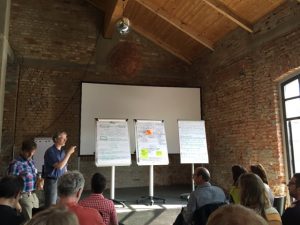 The Geovisualisation group at the Leibniz-Institut für Länderkunde, led by Francis Harvey, (http://www.ifl-leipzig.de/en/research/geovisualisation.html) organised a workshop to discuss the future of the atlas (http://atlaszukuenfte.nationalatlas.de, in German). Not long ago, when someone wanted to access geographic information, they would reach for their atlas and look up what they were interested in. With the proliferation of digital and online maps, many people now turn to readily available online services instead of their atlas. Still, an atlas is more than just a collection of maps: it is carefully curated and the maps and diagrams it contains are usually of a very high quality. The people creating an atlas also invest a lot of thought what (not) to include and which diagrams and maps to combine on a single page. These useful aspects are frequently lost when transitioning to ‘vanilla’ online maps.
The Geovisualisation group at the Leibniz-Institut für Länderkunde, led by Francis Harvey, (http://www.ifl-leipzig.de/en/research/geovisualisation.html) organised a workshop to discuss the future of the atlas (http://atlaszukuenfte.nationalatlas.de, in German). Not long ago, when someone wanted to access geographic information, they would reach for their atlas and look up what they were interested in. With the proliferation of digital and online maps, many people now turn to readily available online services instead of their atlas. Still, an atlas is more than just a collection of maps: it is carefully curated and the maps and diagrams it contains are usually of a very high quality. The people creating an atlas also invest a lot of thought what (not) to include and which diagrams and maps to combine on a single page. These useful aspects are frequently lost when transitioning to ‘vanilla’ online maps.
The two-day, by-invitation-only workshop at Leipzig (June 9th and 10th) brought together scientists and practitioners with different backgrounds, ranging from arts over literature, social sciences and cartography to geoinformatics and computer science. At the event, several key aspects and challenges were discussed, including the role of curation, how people will want to interact with the atlas of the future and what economic models can fund atlas-related work. Researchers from ifgi constituted the largest group of external experts and highlighted relevant issues such as transparency and openness, real-time sensor data and accessible user interfaces.
 The Geovisualisation group at the Leibniz-Institut für Länderkunde, led by Francis Harvey, (http://www.ifl-leipzig.de/en/
The Geovisualisation group at the Leibniz-Institut für Länderkunde, led by Francis Harvey, (http://www.ifl-leipzig.de/en/